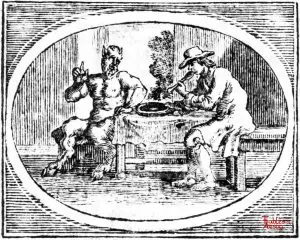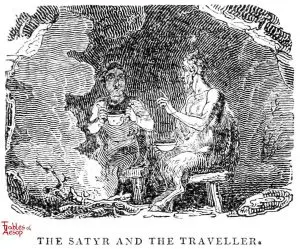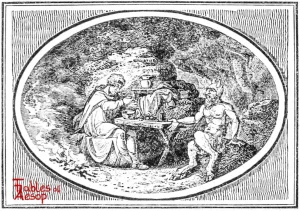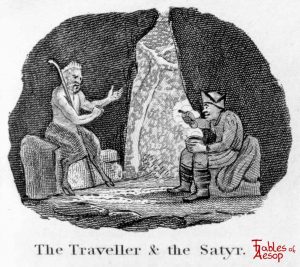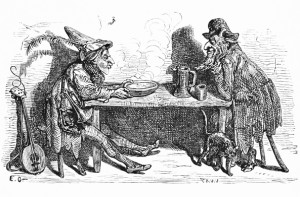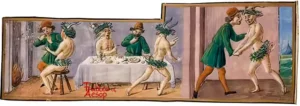A Satyr is confused by a man blowing to both heat and cool and refused to deal with him thinking he was double dealing.
Maintain a single position.

Aesop For Children
A long time ago a Man met a Satyr in the forest and succeeded in making friends with him. The two soon became the best of comrades, living together in the Man’s hut. But one cold winter evening, as they were walking homeward, the Satyr saw the Man blow on his fingers.
“Why do you do that?” asked the Satyr.
“To warm my hands,” the Man replied.
When they reached home the Man prepared two bowls of porridge. These he placed steaming hot on the table, and the comrades sat down very cheerfully to enjoy the meal. But much to the Satyr’s surprise, the Man began to blow into his bowl of porridge.
“Why do you do that?” he asked.
“To cool my porridge,” replied the Man.
The Satyr sprang hurriedly to his feet and made for the door.
“Goodby,” he said, “I’ve seen enough. A fellow that blows hot and cold in the same breath cannot be friends with me!”
Moral
The man who talks for both sides is not to be trusted by either.

Eliot/Jacobs Version
A Man had lost his way in a wood one bitter winter’s night. As he was roaming about, a Satyr came up to him, and finding that he had lost his way, promised to give him a lodging for the night, and guide him out of the forest in the morning. As he went along to the Satyr’s cell, the Man raised both his hands to his mouth and kept on blowing at them. “What do you do that for?” said the Satyr.
“My hands are numb with the cold,” said the Man, “and my breath warms them.”
After this they arrived at the Satyr’s home, and soon the Satyr put a smoking dish of porridge before him. But when the Man raised his spoon to his mouth he began blowing upon it. “And what do you do that for?” said the Satyr.
“The porridge is too hot, and my breath will cool it.”
“Out you go,” said the Satyr. “I will have nought to do with a man who can blow hot and cold with the same breath.”

Samuel Croxall (The Satyr and the Traveller)
A SATYR, as he was ranging the forest in an exceeding cold snowy season, met with a Traveller half-starved with the extremity of the weather. He took compassion on him, and kindly invited him home to a warm comfortable cave he had in the hollow of a rock. As soon as they had entered and sat down, notwithstanding there was a good fire in the place, the chill Traveller could not forbear blowing his fingers’ ends. Upon the Satyr’s asking him, why he did so; he answered, that he did it to warm his hands. The honest Sylvan having seen little of the world, admired a man who was master of so valuable a quality as that of blowing heat, and therefore was resolved to entertain him in the best manner he could. He spread the table before him with dried fruits of several sorts; and produced a remnant of cold cordial wine, which, as the rigour of the season made very proper, he mulled with some warm spices, infused over the fire, and presented to his shivering guest. But this the Traveller thought fit to blow likewise; and upon the Satyr’s demanding a reason why he blowed again, he replied, to cool his dish. This second answer provoked the Satyr’s indignation, as much as the first had kindled his surprise: so, taking the Man by the shoulder, he thrust him out of doors, saying, he would have nothing to do with a wretch who had so vile a quality as to blow hot and cold with the same mouth.
THE APPLICATION
Though the poor Traveller in the Fable was not guilty of any real crime in what he did, yet one cannot help approving the honest simplicity of the Satyr, who could not be reconciled to such double dealing. In, the moral sense of the fable, nothing can be more offensive to one of a sincere heart, than he that blows with a different breath from the same mouth; who flatters a man to his face, and reviles him behind his back. Some again, just like this man, to serve a present view, will blow nothing but what is warm, benevolent and cherishing; and when they have raised the expectations of a dependant to a degree which they think may prove troublesome, can, with putting on a cold air, easily chill and blast all his blooming hopes. But such a temper, whether it proceeds from a designed or natural levity, is detestable, and has been the cause of much trouble and mortification to many a brave deserving man. Unless the tenor of a man’s life be always true and consistent with itself, the less one has to do with him the better.

Thomas Bewick (The Satyr and The Traveller)
A Satyr, as he was ranging the forest in an exceeding cold snowy season, met with a Traveller half-starved with the extremity of the weather. He took compassion on him, and kindly invited him home to a warm cave he had in the hollow of a rock. As soon as they had entered and sat down, notwithstanding there was a good fire in the place, the chilly Traveller could not forbear blowing his fingers. Upon the Satyr asking him why he did so? He answered, that he did it to warm his hands. The honest Sylvan having seen little of the world, admired a man who was master of so valuable a quality as that of blowing heat; and therefore resolved to entertain him in the best manner he could. He spread the table with dried fruits of several sorts, and produced a remnant of old cordial wine, which he mulled with some warm spices over the fire, and presented to his shivering guest. But this the Traveller thought fit to blow upon likewise; and when the Satyr demanded a reason why he did so, he replied, to cool his dish. This second answer provoked the Satyr’s indignation as much as the first had kindled his surprise; so, taking the man by the shoulders, he thrust him out of the place, saying, he would have nothing to do with a wretch who had so vile a quality as to blow hot and cold with the same breath.
APPLICATION.
Nothing can be more offensive to a man of a sincere honest heart, than he who blows with different breaths from the same mouth: who flatters a man to his face, and reviles him behind his back. Such double-dealing false friends ought and will always be considered as unworthy of being treated otherwise than as worthless and disagreeable persons: for unless the tenor of a man’s life be always true and consistent with itself, the less one has to do with him the better. It is unfortunately too common with persons of this cast of character, in the exalted stations of life, to serve a present view, or perhaps only the caprice or whim of the moment, to blow nothing but what is warm, benevolent, and cherishing, to raise up the expectations of a dependent to the highest degree; and when they suspect he may prove troublesome, they then, by a sudden cold forbidding air, easily blast all his hopes and expectations: but such a temper, whether it proceed from a designed or natural levity, is detestable, and has been the cause of much trouble and mortification to many a brave deserving man.

Jefferys Taylor (The Traveler and The Satyr)
A LUCKLESS wight, in winter snow,
Travelling once a forest through,
Cold and hungry, tired and wet,
Began in words like these to fret:
“Oh! what a sharp, inclement day!
And what a dismal, dreary way!
No friendly cot, no cheering fields,
No food this howling forest yields;
I’ve nought in store or expectation;
There’s nought before me but starvation.
“Not quite so bad,” a voice replied;
Quickly the traveller turn’d aside,
And saw the satyr of the wood,
Who close beside his dwelling stood.
“Here is my cave hard by,” said he,
“Walk in, you’re welcome, pray be free.”
The traveller did not hesitate,
Hoping for something good to eat,
But followed to his heart’s content,
Blowing his fingers as he went.
“Pray,” said the Satyr, “may I know
For what you blow your fingers so?”
“What! need you,” said the man, “be told?—
To warm my fingers, ‘numb’d with cold.”
“Indeed!” was all his host replied,
Intent some pottage to provide,
Which heated well, with spice infused,
Was to his shivering guest produced:
So hot it was, as Aesop sung,
It made our traveller scald his tongue;
And wishing not again to do it,
Our hero could not wait, but blew it.
“What!” said his host in accent rough,
“Is not your pottage hot enough?”
“Yes,” said the man, “full well I know it,
Tis far too hot, that’s why I blow it.”
“You artful villain! do you so?”
His host replied, with angry brow;
“My cave shall not a moment hold
A man that blows both hot and cold!
By none but rogues can that be done:
You double-dealing wretch, begone!”
The traveller scarce deserved such wrath,
For warming fingers—cooling broth.
No statutes old or new forbid it,
Although with the same mouth he did it:
Yet this beware of, old and young,
What Aesop meant—a double tongue;
Which flatters now with civil clack,
And slanders soon behind one’s back.

JBR Collection (The Satyr and The Traveller)
A Satyr, ranging in the forest in winter, came across a Traveller half starved with the cold. He took pity on him and invited him to go to his cave. On their way the Man kept blowing upon his fingers. “Why do you do that?” said the Satyr, who had seen little of the world. “To warm my hands, they are nearly frozen,” replied the Man. Arrived at the cave, the Satyr poured out a mess of smoking pottage and laid it before the Traveller, who at once commenced blowing at it with all his might. “What, blowing again!” cried the Satyr. “Is it not hot enough?” “Yes, faith,” answered the Man, “it is hot enough in all conscience, and that is just the reason why I blow at it.” “Be off with you!” said the Satyr, in alarm; “I will have no part with a man who can blow hot and cold from the same mouth.”

Townsend version
A man and a Satyr once drank together in token of a bond of alliance being formed between them. One very cold wintry day, as they talked, the Man put his fingers to his mouth and blew on them. When the Satyr asked the reason for this, he told him that he did it to warm his hands because they were so cold. Later on in the day they sat down to eat, and the food prepared was quite scalding. The Man raised one of the dishes a little towards his mouth and blew in it. When the Satyr again inquired the reason, he said that he did it to cool the meat, which was too hot. “I can no longer consider you as a friend,” said the Satyr, “a fellow who with the same breath blows hot and cold.”

Crane Poetry Visual
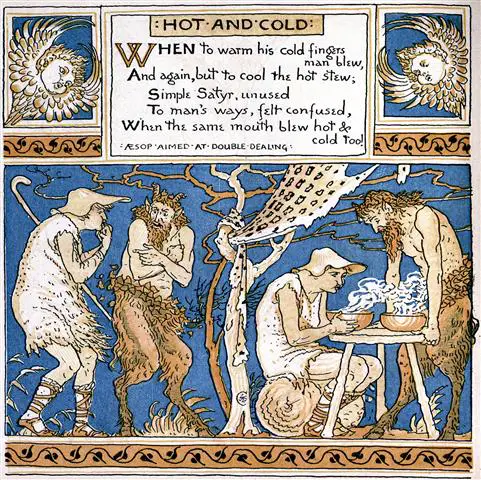
When to warm his cold fingers man blew,
And again, but to cool the hot stew.
Simple Satyr, unused
To man’s ways, felt confused,
When the same mouth blew hot & cold too!
Aesop aimed at double dealing.

Gherardo Image from 1480

Satyrus et Viator
Satyrus viatorem, nive obrutum atque algore enectum, misertus ducit in antrum suum. Refocillantem manus anhelitu oris percontatur causam; “Ut calefiant,” inquit. Postea, cum accumberent, sufflat viator in polentam. Quod cur ita faceret interrogatus, “Ut frigescat,” inquit. Tunc continuo Satyrus viatorem eiiciens, “Nolo,” inquit, “in meo ut sis antro, cui tam diversum est os.”
Moral
Fabula innuit devitandum esse eius amicitiam cuius anceps vita est et non simplex sermo, cuius cor et lingua dissimiles partes agunt.
Perry#035

